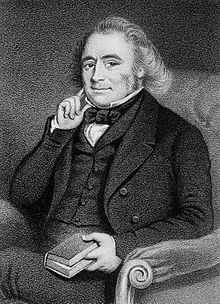Hartley Coleridge
| Hartley Coleridge | |
|---|---|
 |
|
| Born |
19 September 1796 Clevedon |
| Died | 6 January 1849 (aged 52) Rydal, Cumbria |
| Nationality | British |
| Genre | poetry, essays, biographies |
David Hartley Coleridge (19 September 1796 – 6 January 1849) was an English poet, biographer, essayist, and teacher. He was the eldest son of the poet Samuel Taylor Coleridge. His sister Sara Coleridge was a poet and translator, and his brother Derwent Coleridge was a scholar and author. Hartley was named after the philosopher David Hartley.
Hartley was born in Clevedon, a small village near Bristol. His father mentions Hartley in several poems, including the well known Frost at Midnight, where he addresses him as his "babe so beautiful", and in his The Nightingale: A Conversation Poem, both of which are concerned with young Hartley's future.
In the Autumn of 1800 Samuel Taylor Coleridge moved his wife and young son Hartley to the Lake District. They took a home in the vale of Derwentwater, on the bank of the Greta River, about a mile away from Greta Hall, Keswick, the future home of the poet Robert Southey, which was then being built. Hartley spent his early years in the care of Robert Southey at Greta Hall, which possessed the best library in the neighbourhood.
Hartley's brother, Derwent says the following about Hartley's time at Greta Hall:
"The unlimited indulgence with which he was treated at Greta Hall, tended, without doubt, to strengthen the many and strong peculiarities of his nature, and may perhaps have contributed to that waywardness and want of control, from which in later-life he suffered so deeply."
Hartley received his early education from his father. In 1807 he was taken by his father and William Wordsworth to Coleorton, in North West Leicestershire, and then to London. Here he visited the London theatres, and the Tower of London with Walter Scott. He was also introduced to the study of chemistry by Humphry Davy.
...
Wikipedia
